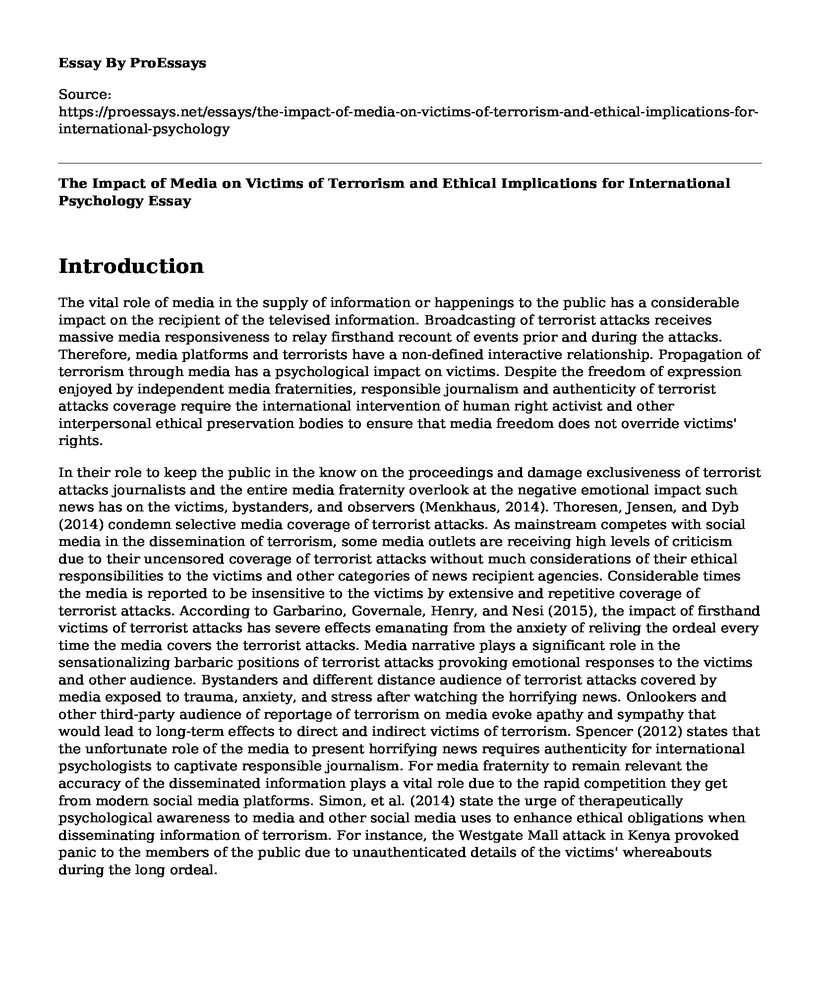Introduction
The vital role of media in the supply of information or happenings to the public has a considerable impact on the recipient of the televised information. Broadcasting of terrorist attacks receives massive media responsiveness to relay firsthand recount of events prior and during the attacks. Therefore, media platforms and terrorists have a non-defined interactive relationship. Propagation of terrorism through media has a psychological impact on victims. Despite the freedom of expression enjoyed by independent media fraternities, responsible journalism and authenticity of terrorist attacks coverage require the international intervention of human right activist and other interpersonal ethical preservation bodies to ensure that media freedom does not override victims' rights.
In their role to keep the public in the know on the proceedings and damage exclusiveness of terrorist attacks journalists and the entire media fraternity overlook at the negative emotional impact such news has on the victims, bystanders, and observers (Menkhaus, 2014). Thoresen, Jensen, and Dyb (2014) condemn selective media coverage of terrorist attacks. As mainstream competes with social media in the dissemination of terrorism, some media outlets are receiving high levels of criticism due to their uncensored coverage of terrorist attacks without much considerations of their ethical responsibilities to the victims and other categories of news recipient agencies. Considerable times the media is reported to be insensitive to the victims by extensive and repetitive coverage of terrorist attacks. According to Garbarino, Governale, Henry, and Nesi (2015), the impact of firsthand victims of terrorist attacks has severe effects emanating from the anxiety of reliving the ordeal every time the media covers the terrorist attacks. Media narrative plays a significant role in the sensationalizing barbaric positions of terrorist attacks provoking emotional responses to the victims and other audience. Bystanders and different distance audience of terrorist attacks covered by media exposed to trauma, anxiety, and stress after watching the horrifying news. Onlookers and other third-party audience of reportage of terrorism on media evoke apathy and sympathy that would lead to long-term effects to direct and indirect victims of terrorism. Spencer (2012) states that the unfortunate role of the media to present horrifying news requires authenticity for international psychologists to captivate responsible journalism. For media fraternity to remain relevant the accuracy of the disseminated information plays a vital role due to the rapid competition they get from modern social media platforms. Simon, et al. (2014) state the urge of therapeutically psychological awareness to media and other social media uses to enhance ethical obligations when disseminating information of terrorism. For instance, the Westgate Mall attack in Kenya provoked panic to the members of the public due to unauthenticated details of the victims' whereabouts during the long ordeal.
References
Garbarino, J., Governale, A., Henry P. & Nesi, D. (2015). Children and Terrorism, Social Policy Report, 29(2).
Menkhaus, K. (2014). Al - Shabaab and social Media: A Double -Edged Sword. Brown Journal of World Affairs, 20(11), 309- 327.
Simon, T., Goldberg, A., Aharonson-Daniel, L., Leykin, D. & Adini, B. (2014). Twitter in the Cross Fire-The Use of Social Media in the Westgate Mall Terror Attack in Kenya. PLoS ONE 9(8): e104136. doi:10.1371/journal.pone.0104136.
Spencer, A. (2012). Lessons Learnt: Terrorism and the Media. Wiltshire: Arts and Humanities Research Council (AHRC).
Thoresen, S., Jensen, T.K. & Dyb, G. (2014). Media Participation and Mental Health in Terrorist Attack Survivors. Journal of Traumatic Stress 27, 639-646.
Cite this page
The Impact of Media on Victims of Terrorism and Ethical Implications for International Psychology. (2022, Apr 12). Retrieved from https://proessays.net/essays/the-impact-of-media-on-victims-of-terrorism-and-ethical-implications-for-international-psychology
If you are the original author of this essay and no longer wish to have it published on the ProEssays website, please click below to request its removal:
- Five Different Prompts on Main Subjects Covered in the Humanities Paper Example
- Keeping Animals in Zoos Should Be Banned for Life - Essay Sample
- Chairman Mao en Route to Anyuan: A Perfect Example of Propaganda Art Essay
- Emo Music: The Subculture of Emotional Expression in the 21st Century - Essay Sample
- Gender Identity: Nature vs Nurture Debate - Essay Sample
- Essay Example on Gender Inequality in the Workplace: Examining HR as the Source
- Essay Example on Rick & Morty: Indictment for Burglary & Other Crimes







